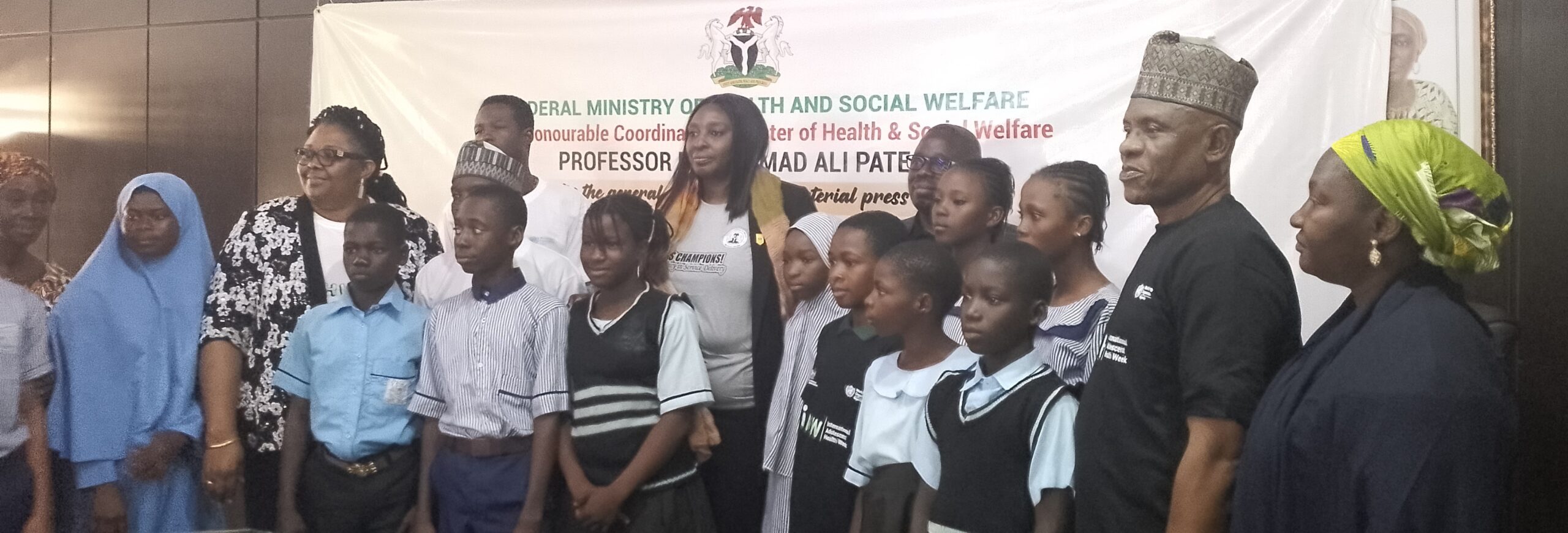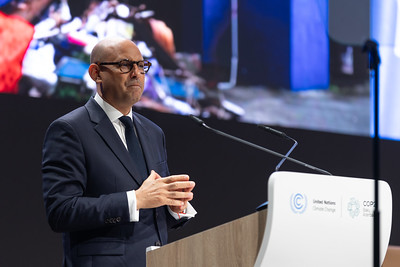2024 IAHW: Parental Responsibility for Adolescent Well-being Emphasized by Federal Government

By Fatima Saka
Amidst the global observance of the 2024 International Adolescent Health Week, commencing on the 7th of October, the Federal government has urged all parents to prioritize the welfare of their children, emphasizing that no child should be left to fend for themselves.
Highlighting the equal significance of both male and female children, the Federal Ministry of Health and Social Welfare, led by the coordinating Minister Professor Muhammad Ali Pate, underscored the critical importance of mental health for adolescents.
During the commemoration of the 2024 International Adolescent Health Week on Thursday in Abuja, the Coordinating Minister who is represented by the Permanent Secretary of the Federal Ministry of Health and Social Welfare, Kachollom Shangti Daju, conveyed a stern message to parents regarding their role in safeguarding the well-being of their children.
In alignment with the Minister’s address, the focus was placed on this year’s theme, “Thriving, Not Surviving: Building Adolescents’ Resilience.”
The Minister’s speech emphasized the imperative need for collective action to ensure that today’s youth are not merely existing but thriving, equipped to confront life’s adversities with resilience, fortitude, and self-assurance.
Acknowledging adolescence as a pivotal phase characterized by rapid physical, emotional, and mental development, the Minister highlighted the challenges faced by young individuals, including mental health issues, gender-based violence, substance abuse, risky sexual behaviors, bullying, as well as systemic obstacles such as poverty, limited access to quality healthcare, and educational deficiencies.
The call to action resonated in the Minister’s words, emphasizing that adolescents are not just the future but an integral part of the present societal fabric. “Their health and resilience are instrumental in shaping the trajectory of the nation’s advancement.
“The theme for this year, “Building Adolescents’ Resilience,” resonates profoundly, underscoring the collective responsibility of policymakers, healthcare professionals, educators, and community leaders to cultivate environments conducive to fostering resilience among adolescents.
“This entails providing them with comprehensive healthcare, mental health support, quality education, and safe spaces, equipping them with the necessary tools, knowledge, and assistance to not only survive but thrive.
“The Federal Ministry of Health remains steadfast in its commitment to enhancing adolescent health systems nationwide.
” Initiatives such as the Adolescent Girls Initiative for Learning and Empowerment (AGILE) Project are being implemented to ensure adolescent girls have access to menstrual hygiene products, reproductive health education, and mental health support services. Moreover, there is a concerted effort to engage male children in these initiatives to garner their understanding and endorsement.”
In her address, the Permanent Secretary of the Ministry of Health and Social Welfare, Daju S. Kachollom mni, represented by Director of Family Health, Dr. Binyerem C. Ukaire, underscored the ongoing challenges faced by adolescents, from mental health issues to inadequate access to healthcare and education, indicating that significant work remains to be done.
Ismail Shehu, the Health Officer of the FCT Universal Education Board,emphasized the pivotal role of guidance and counseling in shaping adolescents’ lives within school settings. “Teachers in FCT schools play a crucial role in providing guidance not only on health matters but also on educational and career pathways, empowering students to make informed decisions about their future.”
According to him, Efforts are underway to fortify school health systems by ensuring schools are equipped with adequate health facilities and personnel to address the unique needs of adolescents.
“Accessible mental health services are being provided to address the escalating concerns of anxiety, depression, and related issues. Educators are being empowered through the provision of essential tools and training for comprehensive guidance and counseling.”
Maimuna Abdullahi, the advocacy and accountability specialist of the African Health Budget Network (AHBN), highlighted the significance of Adolescent Health Week in prompting stakeholders to reflect on the distinctive challenges faced by young individuals and reiterating their commitment to addressing their health needs comprehensively.
Abdullahi emphasized that adolescence is a pivotal period of growth and development, underscoring the importance of ensuring access to health services, education, and support during this phase to shape a healthy and prosperous future for the nation.
The AHBN remains aligned with the Federal Ministry of Health, advocating for the provision of youth-friendly services, promoting mental health, addressing reproductive health concerns, and empowering adolescents to make informed decisions about their well-being,” she expressed.
Abdullahi called for substantial investment in adolescent health, framing it as an investment in Nigeria’s future. Together, she emphasized, a healthier, more resilient generation can be nurtured, contributing to the nation’s growth and development.
Representing an adolescent group, Fatima Jibril from JSS Kuchigoro in FCT, underscored the necessity for programs inclusive of individuals from all backgrounds, particularly in rural areas.
She advocated for schools to serve as safe spaces where adolescents can openly discuss their physical, sexual, and mental health without fear of judgment, receiving the necessary assistance.
Jibril also emphasized the need for equal career opportunities and beneficial programs for adolescents, expressing readiness to collaborate with parents, teachers, and healthcare professionals to develop activities and initiatives that educate and empower them to advocate for their health and well-being.





